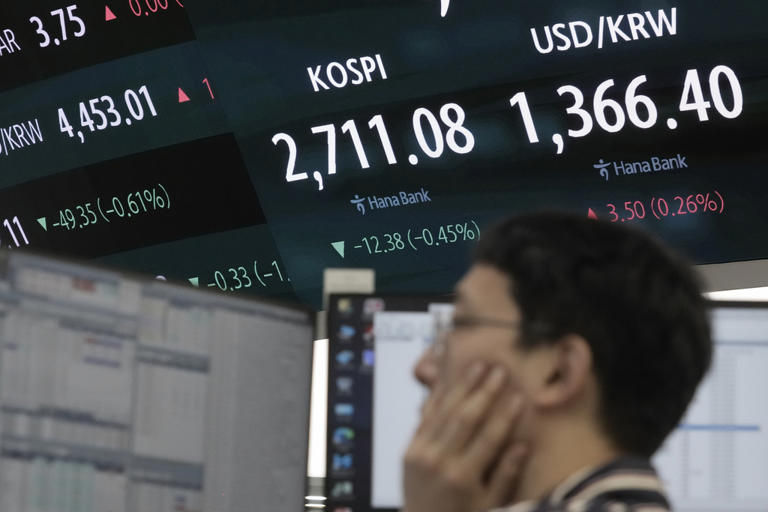Asian markets experienced a mixed performance on Thursday, influenced by various regional and global factors, most notably the impressive earnings report from Nvidia, which boosted investor sentiment in Tokyo. Japan’s benchmark Nikkei 225 index surged by 1.3%, reaching 39,103.22. This rise was largely attributed to the semiconductor sector’s positive response to Nvidia’s earnings. Nvidia, the American technology giant, reported a significant earnings beat, with its quarterly net income skyrocketing more than sevenfold to $14.88 billion. The company’s revenue also more than tripled, underscoring Nvidia’s pivotal role in the burgeoning artificial intelligence market. This news buoyed semiconductor-related stocks, contributing to the overall rise in Tokyo’s market.
In contrast, Australia’s S&P/ASX 200 index fell by 0.5% to 7,811.80. South Korea’s Kospi showed a modest increase of 0.1%, ending at 2,726.33. However, markets in China were less optimistic. Hong Kong’s Hang Seng index dropped significantly by 1.6% to 18,892.21, and the Shanghai Composite index decreased by 1.2% to 3,120.35. The declines in these markets were likely influenced by a range of local economic concerns and broader regional uncertainties.
In other parts of Asia, the Bank of Korea decided to keep its policy rate unchanged, a move that was widely anticipated by market participants. This decision reflects the bank’s cautious approach amidst a complex economic environment characterized by high inflation and varying degrees of economic recovery across the region.
Meanwhile, on Wall Street, major U.S. indices pulled back from their recent record highs, weighed down by concerns over high interest rates. The S&P 500 fell by 0.3% to 5,307.01, a day after setting its latest all-time high. Similarly, the Dow Jones Industrial Average declined by 0.5% to 39,671.04, and the Nasdaq Composite slipped by 0.2% to 16,801.54. The retreat followed the release of the Federal Reserve’s latest meeting minutes, which suggested that it might take longer than previously expected to bring inflation fully under control. Despite Federal Reserve Chair Jerome Powell indicating that the central bank is more likely to cut rates than hike them, the minutes revealed that several officials were still considering rate increases if inflation worsens. This tempered investors’ hopes that the Fed would soon be able to cut its main interest rate, which is currently at its highest level in more than 20 years.
In corporate news, Lululemon Athletica’s shares plummeted by 7.2% after the company announced that its Chief Product Officer, Sun Choe, would be leaving to pursue another opportunity. Additionally, the company unveiled a new organizational structure that eliminates the role of Chief Product Officer, which may have contributed to investor concerns about the company’s future strategic direction.
In the bond market, the yield on the 10-year Treasury note inched up to 4.42% from 4.41%, while the two-year yield, which is more closely tied to expectations for Federal Reserve policy, rose to 4.87% from 4.84%. These yield movements reflect ongoing adjustments in the market as investors interpret the Fed’s signals regarding future monetary policy.
The Federal Reserve is attempting a delicate balance: raising interest rates to curb inflation without pushing the economy into a severe recession. High interest rates have increased the cost of borrowing, affecting everything from credit-card bills to auto-loan payments, and mortgage rates remain high. A report released on Wednesday showed that sales of previously occupied homes were weaker than economists had expected, highlighting the broader economic impact of sustained high interest rates.
Globally, central banks appear cautious about cutting interest rates despite some softening in inflation and economic activity. According to Athanasios Vamvakidis, a strategist at Bank of America, while central banks might eventually lower rates, the cuts will likely be shallow and delayed. This perspective suggests that financial markets may need to adjust their expectations regarding the timing and extent of future rate cuts.
In commodity trading, U.S. benchmark crude oil prices fell by 57 cents to $77.00 per barrel, while Brent crude, the international standard, decreased by 51 cents to $81.39 per barrel. In currency markets, the U.S. dollar weakened slightly against the Japanese yen, falling to 156.62 yen from 156.80 yen. The euro saw a modest increase against the dollar, rising to $1.0830 from $1.0824.
In summary, while Nvidia’s robust earnings provided a significant boost to certain Asian markets, broader economic concerns, high interest rates, and cautious central bank policies continue to influence global financial markets. Investors are closely monitoring economic data and central bank communications for further insights into the future direction of interest rates and market trends.
